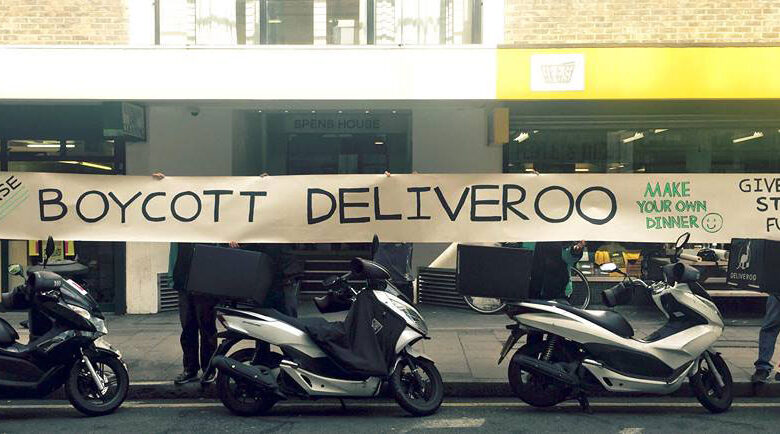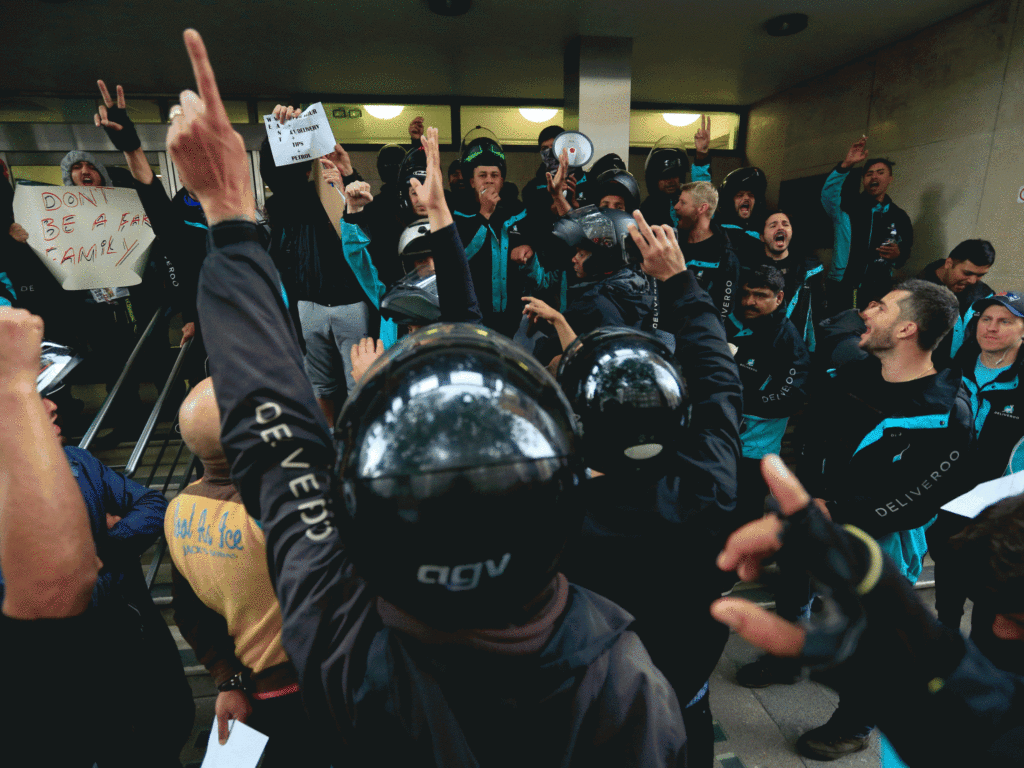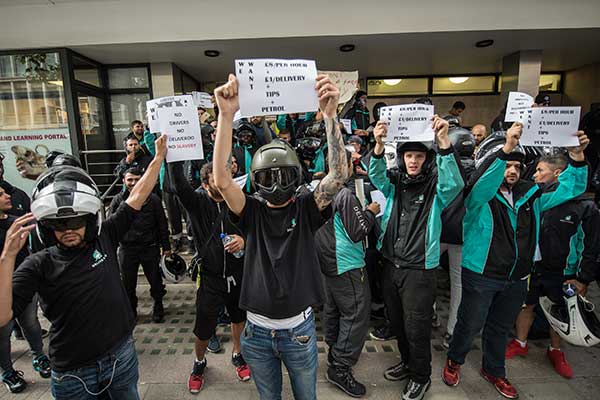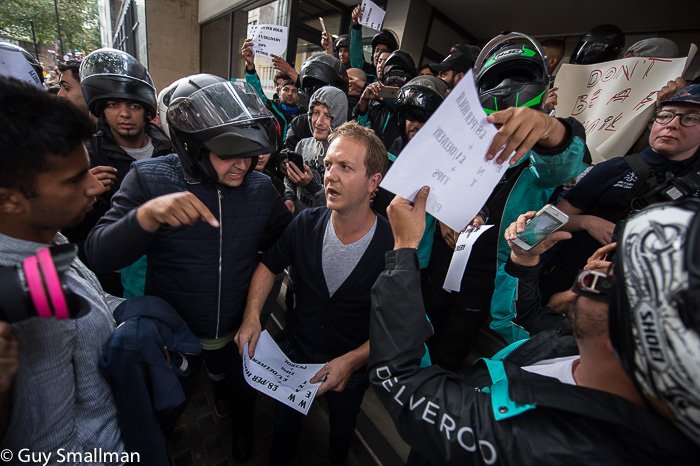
Boss or spy – how data killed office trust
Takeaways from Cybersalon 7th Dec 2018-01-03
LinkedIn is inviting bosses to spy on their employees by offering a premium ‘boss-view’ service (1).
New tools let supervisors see if the employee clicked on a job ad posted by a different company, how many times she/he put a new blog and how many Likes it obtained. In response, new, privacy-positive job social sites are already springing up in response to LinkedIn ill-judged work surveillance attempts. Sites like creativepool.com or jobbio.com will not share your job searches with your boss. Not just white collar workers but also blue collar workers are consistently tracked on social media as well as thru GPS and other tracking tools.
On 7th December Cybersalon held a panel at Newspeak House to dive into the exact nature of new surveillance at work. The area is not well legislated and many Sillicon Valley companies use the approach of ‘break and first, apologise later”.

Why strike?
David Dahlborn, a young historian from UCL and IWUGB trade union activist, revealed the story of Deliveroo drivers’ strike (June 2017 ) and explained the main reason for the protest. As the drivers are measured per delivery, not per time worked, Deliveroo drivers’ job allocation system has initially created an illusion of control for the drivers – and then promptly classified them as self-employed workers. However, in reality the job involves a lot waiting, hanging about and almost complete lack of control over the number of deliveries that are dropping into drivers’ instruction box.
The company initiated new , revised contracts, that were deemed to be unfair by the drivers and a strike has been called to fight the new rules. David was involved in organising the drivers and enrolling them into Independent Workers Union GB, the only union that was interested in helping the drivers that were discouraged by Deliveroo to form a trade union within the company.
As technology created the tension, Deliveroo platform being the company core tool but not recognizing responsibility for their drivers as employees, it was initially considered that the technology of the platform was the enemy. On the drivers’ banners there was a slogan: BOYCOTT DELIVEROO

WhatsUp for the many
However, as David observed, technology was also going to solve the problem. WhatsUp and Facebook Groups were the key tools for self-organisation of the drivers. The challenge was that the drivers were hardly ever together, with the jobs being spread widely across the capital and beyond. There is no locker room, or canteen to meet and compare contracts, discuss conditions and agree consensus.
David and the other organisers noted that the drivers were already users of social media, many of them being young enough to be native to digital comms. It was an obvious solution then to jump at social media with the scheduling, coordination, sharing responsibilities and negociating a common stand for the striking drivers.
The strike was also carried out with utmost respect for the customers and many ‘please’ and formal, polite phrases were used on the banners, leaflets and on face-to-face meetings.
The strike was ultimately successful, not least thanks to creating the new format of a pop up union and using free communication technology from Facebook to coordinate the striking drivers.
Facebook challenge
As David noted however, it is very risky to rely on Facebook for strike organising tools as there was already a rumour that Deliveroo shareholders were lobbying Facebook Corporation to suspend the activists and to hide the channels /groups used for organising.
The only solution then would be an open source communication platform with an easy to use UX and good technical support. Cooperative ownership of such platform was noted as the priority for IWU GB.
As the strike has shown, communication technology so far is neutral, but employees can’t rely on good heart of large techorporations with often cross-holding with the gig economy companies.
The strike has also indicated that gig economy platforms are still about people not about technology. The slogan was: “No Drivers, no Deliveroo”. Drivers have been very successful in regaining their bargaining power as with no drivers, the company could not function.
In addition, as the second speaker, Alessandro Gandini (King’s College, London) and author of a new book Human and Machines at Work noted, the data from deliveries is used to prepare ArtificiaI Intelligence and Machine Learning platforms for fully automated delivery robots, but that is a story for a different Cybersalon later in Spring 2018.

Growing Gig Economy
Alessandro also noted that the scale of of gig economy has exceeded anyone’s expectations, with 1.2mln people (or 4% of work force in UK) is on those platforms – from warehouse/logistics to AirBnB managers to Uber drivers. Alessandro has recently co-authored a chapter in Human and Machines at Work and shared data from his research on how both bosses and workers deal with digital tools to gain power.
The platforms are exploiting the one-sidedness of dashboards, using data to drive their targets and making targets always a fraction higher than it is actually possible to achieve at a particular level of worker’s training.
Bosses are also going beyond trackers and GPS – Alessandro notes that over 2% of UK workers were asked for Social Media password during recruitment procedure.
Emotional Labour
One sticky point that has not been fully understood is the concept of “emotional labour” – providing the rating of Customer service on the platforms leads to the situation of “be nice or be gone”- in practice for Deliveroo or Uber drivers it means to be ‘deactivated’ without any recourse (see Deliveroo driver’s story on what happens when a small exchange with the customer resulted in a drop of ratings and “deactivation”).
Rating is generally useful as it shows expectations to the drivers and couriers, with forms of manners and politeness specified. However, Alessandro noted it is often not clear what standards of ‘politeness’ are required, extra effort is not paid for and it is often confusing to drivers what exactly they should do, how to smile, how to wish a good day etc. Ratings are subjective and open to interpretation.
Misunderstandings in the field are easy to come by and Alessandro commented that the lack of recourse in any conflict situation creates a vulnerability and imbalance of power.
The future is going to get even more complicated as data is used by Deliveroo to track routes and prepare for robotic delivery. In some cities like Mexico, drones are already used to show advertising to cars and it is only a small step to the same drones delivering pizza to drivers stuck in traffic on the motorway
Old analogue unions versus Digital Pop Up Unions
A wider point on the use of Facebook and WhatsUp in the strike situation was that old unions were not supportive of gig economy workers, had no tools for organising remote, individual workers like Uber or Deliveroo. New unions that are more keen on pop up unions, using WhatsUp and FB groups (with no costs, but with immediate and unlimited reach) are creating new forms of labour resistance and their success should be noted by the old unions.
Don’t be a Luddite
The future of work is uncertain, with workers stuck between the good, bad and ugly work technology and their optimisation platforms, but the conclusion of the panel was that there is no room for Luddite response.
On the contrary, the unions and organisations responsible for the well being of gig economy workers as well as white collars workers under increased surveillance should counter with better technology. Open source, counter surveillance and keeping top IT talent on hand is critical for the well being to labour relationships in UK. When both sides have equal communication tools, the route to negociation is much less arduous so it is the priority for the Unions to get their act together and create a strong, free and open source workers’ communication platform.
Analyse the algorithms
As the message on Deliveroo strike was propagating on Facebook, it is worth noticing that ‘engagement’ seeking FB algorithm worked to drivers’ advantage.
Sophia Drakopoulou (Middlesex University), who was chairing the panel, noted that it is not just what the algorithm fishes out and puts on newsweed, but also what people think it does. In the recent study of You Tube it was revealed that the perception of bias by the algorithm on social media and belief that a particular platform has a preference for specific kind of engagement causes users’ behaviour that may feed different part of algorithms. However, lack of transparency of the algorithm means that it is a hit and miss to create any social action based on the power of ‘viral amplification’
http://eprints.mdx.ac.uk/22876/3/Introduction%252C%2520Final.pdf
DIWO- Do It With Others platorms
The need for own communication platforms, preferably Open Source and independent from the commercial media was emphasised during the Audience Discussion. A term used by Furtherfield comes to fore in the sector of Labour relations.
A collaborative and independent communication tool financed and supported by the Trade Unions was mentioned as one of the best avenues left to those who are concerned with strikes, negotiations or any coordination of gig economy workers. The direction of the job sites being surveillance sites is also calling for a cooperative, not-for-profit and not owned by Microsoft/LinkdIn job search platform to ensure fair and privacy-proof recruitment sites.
The window of “good” technology is closing, as David Dahlborn noted, with future labour negociations likely to get banned from current social media platform. The technical community needs to pay attention and develop proposals for the Trade Unions that can make the route-to-coordination independent of Mark Zuckerberg’s policy.

Next Cybersalon: 25th January at 7PM
Games for Social Change
Speakers:
Rich Metson (Off Grid)
Osmiotic Studios (Orwell)
Chair: Rosa (Corbyn Run)
Venue: Newspeak House 132 Bethnal Green Road




